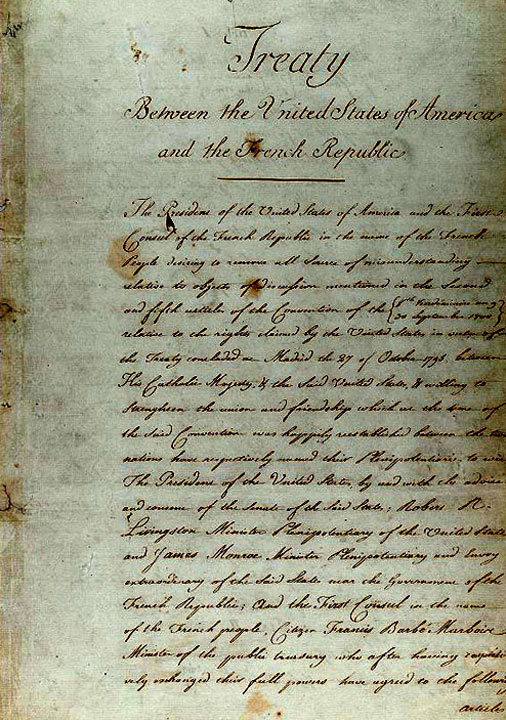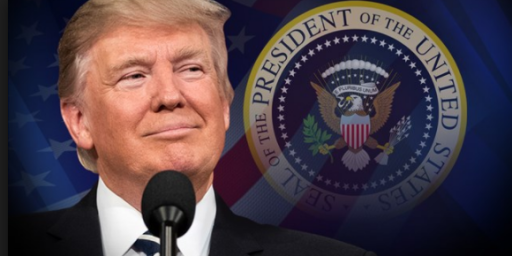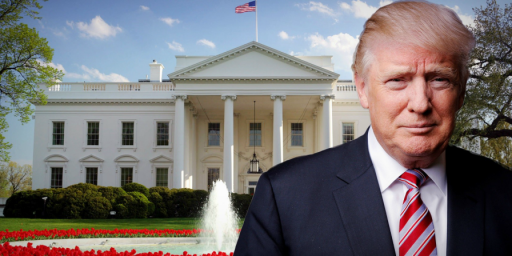Treaties and Executive Agreements
 Steve Benen has a thoughtful post arguing that the Bush administration’s current negotiations with the Iraqi government to define our political, economic and security relationship in the coming years “disregards Congress’ role in treaties.”
Steve Benen has a thoughtful post arguing that the Bush administration’s current negotiations with the Iraqi government to define our political, economic and security relationship in the coming years “disregards Congress’ role in treaties.”
This is an understandable reaction, given the plain language of Article II, Section 2 that the president “shall have Power, by and with the Advice and Consent of the Senate, to make Treaties, provided two thirds of the Senators present concur.” But, as I noted in response to a similar argument by Hillary Clinton (Bush Tying Next President’s Hands) presidents have had the power to enter into executive agreements with other nations since George Washington’s administration. Treaties are binding on future presidents unless modified with Senate consent; executive agreements are not.
The State Department explains:
As explained in greater detail in 11 FAM 721.2, there are two procedures under domestic law through which the United States becomes a party to an international agreement. First, international agreements (regardless of their title, designation, or form) whose entry into force with respect to the United States takes place only after two thirds of the U.S. Senate has given its advice and consent under Article II, section 2, Clause 2 of the Constitution are “treaties.” Second, international agreements brought into force with respect to the United States on a constitutional basis other than with the advice and consent of the Senate are “international agreements other than treaties” and are often referred to as “executive agreements.”
Let’s look, then, at 11 FAM 721.2 to see on what “constitutional basis” a president might enter into such an agreement.
(3) Agreements Pursuant to the Constitutional Authority of the President
The President may conclude an international agreement on any subject within his constitutional authority so long as the agreement is not inconsistent with legislation enacted by the Congress in the exercise of its constitutional authority. The constitutional sources of authority for the President to conclude international agreements include:
(a) The President’s authority as Chief Executive to represent the nation in foreign affairs;
(b) The President’s authority to receive ambassadors and other public ministers;
(c) The President’s authority as “Commander-in-Chief”; and
(d) The President’s authority to “take care that the laws be faithfully executed.”
Arguably, all of these apply in the case of Iraq.
To be sure, the guidelines do specify that there will be times when it’s not clear whether a treaty or an executive agreement is most appropriate and that “Past U.S. practice as to similar agreements,” “The preference of the Congress as to a particular type of agreement,” and “The proposed duration of the agreement” should be taken into account among other factors. As a practical matter, though, this guidance is 1) not binding on the president himself, only his representatives; 2) unenforceable; and 3) largely ignored because of the near-impossibility of passing much of anything by a 2/3 vote in the Senate these days.
As usual, FindLaw does a superb job of summarizing the state of this section of the Constitution as “amended” by decades of court decisions and common practice.
The capacity of the United States to enter into agreements with other nations is not exhausted in the treaty-making power. The Constitution recognizes a distinction between ”treaties” and ”agreements” or ”compacts” but does not indicate what the difference is. The differences, which once may have been clearer, have been seriously blurred in practice within recent decades. Once a stepchild in the family in which treaties were the preferred offspring, the executive agreement has surpassed in number and perhaps in international influence the treaty formally signed, submitted for ratification to the Senate, and proclaimed upon ratification.
During the first half-century of its independence, the United States was party to sixty treaties but to only twenty-seven published executive agreements. By the beginning of World War II, there had been concluded approximately 800 treaties and 1,200 executive agreements. In the period 1940-1989, the Nation entered into 759 treaties and into 13,016 published executive agreements. Cumulatively, in 1989, the United states was a party to 890 treaties and 5,117 executive agreements. To phrase it comparatively, in the first 50 years of its history, the United States concluded twice as many treaties as executive agreements. In the 50-year period from 1839 to 1889, a few more executive agreements than treaties were entered into. From 1889 to 1939, almost twice as many executive agreements as treaties were concluded. In the period since 1939, executive agreements have comprised more than 90% of the international agreements concluded.
Much, much more at the link, but that’s the gist of the history.
My preference would be to eliminate executive agreements beyond those which simply work out the practical details of existing treaties or legislation — making them international corollaries to the executive orders presidents routinely issue to bureaucratic agencies in order to “take care that the laws be faithfully executed.” That ship has, however, long sailed.






By that argument, how would it be illegal for the president to make similar commitments to any other nation? Certainly by that argument the President can enter into any international military treaty without the approval of the Senate.
I don’t see how any of them apply, to Iraq or otherwise. Certainly the President doesn’t need the authority to make defense agreements in order to fulfill his role as Commander in Chief any more than a General needs that authority to fulfill his role as commander of an army.
Well, two points;
1): Given the level of dysfunction we now see in Congress, does the world really want to wait for both those bodies to gather their heads from their backsides?
2): What of other such agreements, such as following WWII?
And by the way… Iraq DOES in fact apply, given the blank check Congress gave Mr. Bush on the subject of Iraq.
I don’t really think we are still worried about Saddam not complying with weapons inspectors, do you? Or did the AUMF give the President the ability to conduct any military operation, anywhere, any time?
The President may conclude an international agreement on any subject within his constitutional authority so long as the agreement is not inconsistent with legislation enacted by the Congress in the exercise of its constitutional authority.
If congress thinks Bush is stepping to far out of line, perhaps Clinton or Obama can spend a few moments out of their busy day and file some legislation on the subject.
But of course that would require the democrats to do something rather than just complain about those who do something.
Which would be fine if everybody accepted this and understood it. But really, when the new president washes their hands of Iraq what are the odds that we *won’t* hear a chorus of catewauling about betraying america’s allies and commitments from the Malkin/RS/LGF/CQ folk?
I’d put it damn near zero.
This is nothing but an attempt to give the right ammunition when the poor bastard who follows after bush tries to clean up the idiot from texas’ messes.
But them’s just the breaks. It goes with the office.
All presidents make decisions that, while not technically binding, put their successors in a box. Bill Clinton’s intervention in Bosnia, for example, of the first George Bush’s intervention in Somalia. You get to be president for every single day of all four years of your term and make your mark.
Which would be none. He has no constitutional authority to conclude any binding agreement whatsoever, unless he subsequently submits it to the senate.
He can make agreements about what he intends to do, certainly, but that’s trivial.
Can you think of any that are this transparently useless other than as a partisan bludgeon?
It’s not like Clinton invaded Bosnia (something I was not at all a fan of, BTW) in his last month in office.
Really is there any other possible point to this agreement other than to score electoral points? Anything? Any purpose at all beside partisan politics?
If so I don’t see it, and unfortunately the selling out of all principle for partisan gain is the defining attribute of the bush administration.
Tlaloc,
Given the roughly 9-1 ratio of executive agreements to treaties, I think you are demonstrating an advanced case of BDS. I can make a great argument that the federal government can’t subsidize agriculture, restrict guns or abortion, limit political speech, etc. But the reality is that these things do happen.
But again, if the democrats are so exercised about this, have congress do something about it. Of course we know that won’t happen because it would require them to actually do something.
The key term again is “binding.” Bush can make agreement between *himself* and whomever he pleases. He can even make agreements between the Executive branch while it is under his control and whomever.
What he cannot do is to make agreements between the US and anyone else unless he gets the senate to sign off on the matter.
But there are constitutional arguments for all of those (commerce clause mostly). Now you can argue that those rationales are improper or not in accordance with the original founders intent, but those are matters of interpretation. The constitution EXPLICITLY says what has to happen for a treaty to be made.
You are right, it is LONG past due that congress insist the executive do his job.
Excellent post, James.
I guess Bush to continue to screw American after he leaves office… and people have the nerve to say he is lazy!
Tlaloc,
So the 13K+ other executive agreements were okay, but this one is not? This is no more binding than any other. On day one, the next president could revoke it. I’m sorry, but I think you aren’t looking at this rationally.
p.s. You will probably get fed some rhetoric on the issue, but expect about as much action on congress blocking this as they did on blocking funding on the war.
Then that’s fine, but the way it is being treated is that it is binding. Consider this:
from here.
Well would this be the first time Bush tried to do something that was a naked grab for power? No, not by a long shot. Hence it seems reasonable to be pretty suspicious.
Now *that* I find very believable.